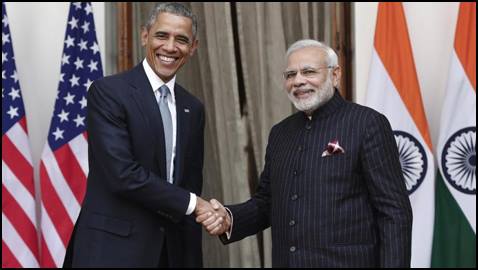Indian Shortcomings Noted By U.S. Foreign Affairs Committee
The Indian officials and media outlets are busy beating the drums of the ‘so-called’ successful visit of Prime Minister Narendra Modi to United States. However, prior his visit United States’ Senate Committee on Foreign Relations scheduled a hearing titled ‘U.S. -India Relations: Balancing Progress and Managing Expectations’. Opening the hearing Senator Robert Corker, who chairs the Committee remarked,
‘India has much to contribute to the international efforts to tackle complex global challenges but here remain a number of challenges as well, including our economic and trade relationships, onerous and unreasonable localization requirements, high tariffs, limits on foreign investment and unparalleled bureaucratic tape, red tape, hinder further access to the Indian market by American businesses. The rhetoric has far outpaced the reforms. Moreover, it appears that trade and investment remain principally transactional for the Indians rather than serving as instrumental tools to establishing a genuinely free market economy. I am concerned that the robust rhetoric has created a widening expectations gap between Washington and Delhi.’
As very rightly noted by Senator Corker; such rhetorical etymology had previously also dominated the India-U.S. statements in 2013, 2014, and 2015. However, so far, less than anticipated progress has been made in the areas of so-called cooperation. It is indeed an acknowledgement by the U.S. legislators that Modi administration speaks more and does too little. The politics of rhetoric might have worked well for Modi in India but it cannot work effectively with articulate Americans.
Senator Benjamin Louis Cardin a ranking member on Foreign Relations Committee while raising the issues of Human rights situation in India stated that ‘the State Department Human Rights wing has a list of concerns related to women’s rights, minority communities, religious freedom, press freedom and the freedom of civil societies in India. He stated that similar concerns have been raised by many of civil society groups including Human Rights Watch. Senator Corker in response to Senator Cardin’s opening remarks stated,
‘I would not expect to have an opening statement from you without human rights being mentioned. So, thank you for that. I would say, that while this committee has been unanimously supportive of an end modern slavery movement that the United States would lead, India also has the largest number of slaves. I’m talking about people working for a dollar a day, and I’m talking about people who are slaves in any country in the world so I very much appreciate you bringing that up.’
Senator Cardin also questioned the emerging India-Iran relationship and questioned,
‘Clearly, anti-terrorism is going to be a huge issue, fighting forms of extremism. Yesterday, I believe an agreement was announced between Iran and India in regards to the Port of Chabahar. Are we concerned, knowing that Iran is continuing to sponsor terrorism in that region? Obviously, there’s nothing that appears to be in violation in any of our agreements, but how do we see India as a partner in fighting extremism and financing of terrorism?’
Nisha Desai Biswal, U.S. Department of State’s Assistant Secretary of Bureau of South and Central Asian Affairs stated,
‘with respect to India’s relationship with Iran, which I do believe is primarily focused on economic and energy issues, we do recognize that from the Indian perspective that Iran represents for India, a gateway into Afghanistan and central Asia’.
Ms. Biswal tried to defend the position of the country of her origin (India) but the fact remains that both Irani and Afghani soils had been used to spread Indian sponsored terrorism in the region.
Pak-Iran Zahidan border has been used for destabilization of Baluchistan. One cannot ignore the annotations made by renowned scholar Christine Fair of U.S. based RAND Cooperation who observed that “having visited the Indian mission in Zahedan, I can assure you they are not issuing visas as the main activity. Moreover, India has run operations from its mission in Mazar (through which it supported the Northern Alliance) and is doing so from the other consulates it has reopened in Jalalabad and Kandahar along the border. Indian officials have told me privately that they are pumping money into Baluchistan’.
Senator David Perdue raised a very important strategic point by questioning,
‘I just have two questions, one related to global security and the other economic. Prime Minister Modi just concluded a two-day visit in Tehran. I think he met with President Rouhani. My information says they signed 12 agreements talking anything from trade to security. You’ve related some comments to relationship with Iran and its growing import to India. I would like you to talk about that in perspective with Pakistan and the relationship that India has with Pakistan. Two nuclear powers, an aspiring nuclear power in Iran and can you talk how do you assess the developments of this growing India- Iran relationship and how does it affect U.S. interest in the region?’
Ms. Biswal responded, ‘we do understand that countering and combating terrorism is an important objective, not just for India for Pakistan, for Afghanistan but for the United States across that area.’
It is very clear that although India wants very strong ties with USA but it is taking different positions on regional interests which can create friction in US-India relationship. India treats Afghani Taliban as a terrorist organization but the U.S. is, in reality, engaged in an effort to accommodate the Taliban politically in Afghanistan in a Pakistan-brokered deal, which is a risk to India’s security. It is thus difficult to see how, in these circumstances, the counter-terrorism partnership between India and the U.S. can be achieved. India has enduring disputes with China. India simply cannot rely on U.S. to take a favorable position of India in any conflicts with China therefore U.S.-India partnership also falls short of supporting India’s territorial dominance.

